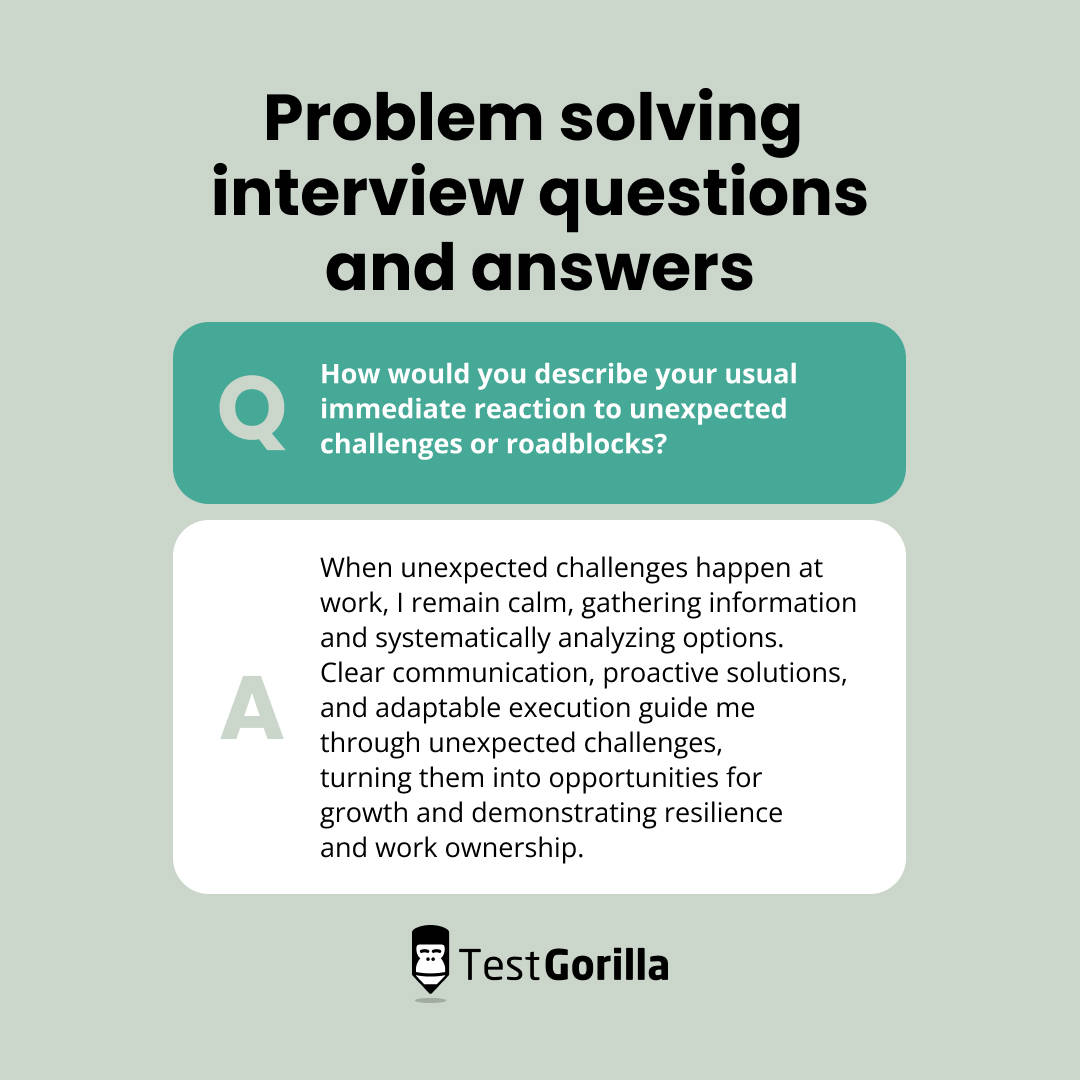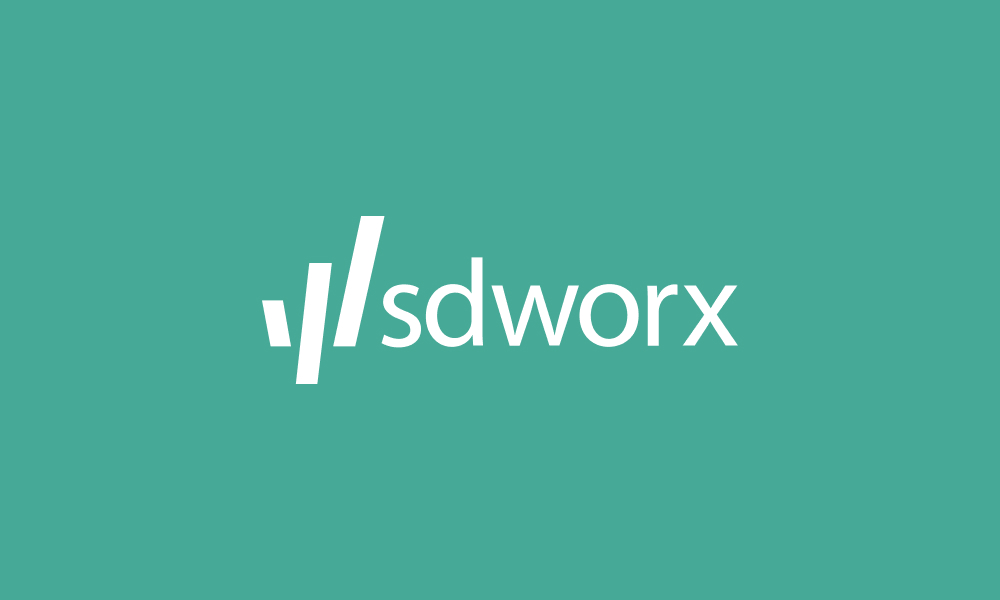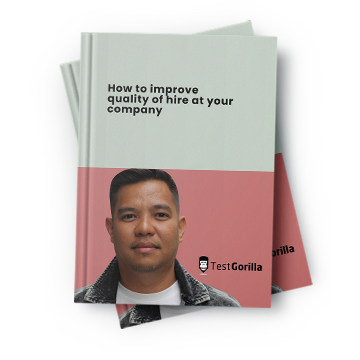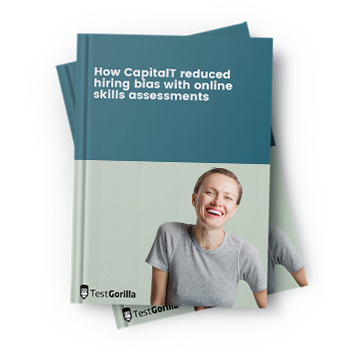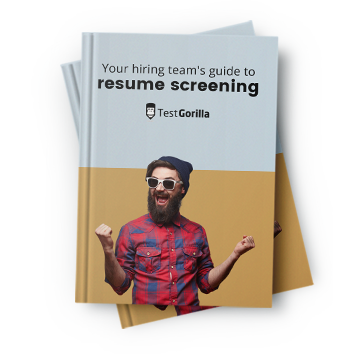Whether you’re hiring new employees for a small business or a large organization, problem-solving skills in the workplace are a must these days.
When it comes to finding the best candidates and hiring the right people, asking the right problem-solving interview questions can be a game-changer. You want to ensure you're hiring someone who can handle anything that comes their way and come up with creative solutions.
So, let's dive in and explore some of the best ways to identify those top-tier problem-solvers with the right problem-solving interview questions.
Table of contents
10 problem-solving interview questions for identifying top-tier problem solvers at work
Below, we’ll go through 10 problem solving interview questions plus sample answers and explain how each one can be useful for identifying candidates with stellar problem-solving skills.
Have you ever had a deadline you weren’t able to meet? What happened? How did you handle it?
We work with many clients with multiple needs, and we aim to provide excellent service to them all. How would you prioritize each client’s needs?
How would you describe your usual immediate reaction to unexpected challenges or roadblocks?
Describe a time when you had to change your strategy at the last minute. How did you handle this situation?
Can you think of a situation at work where you saw an opportunity in a potential problem? What did you do? What was the outcome?
Describe the biggest work-related problem you have experienced. How did you deal with it?
Tell me about a time you had to explain a complex technical concept to someone with no prior knowledge.
How do you deal with problems when you don’t have access to all the necessary information? Can you describe a time when this occurred?
Tell me about a time you worked outside your comfort zone to solve a problem.
What was the most stressful situation you faced at work? How did you handle it?
1. Have you ever had a deadline you weren’t able to meet? What happened? How did you handle it?
Sample answer:
While I strive to meet deadlines consistently, I acknowledge that unexpected challenges can arise. Early in my career, I faced a tight deadline for [project name] when a key team member unexpectedly left the company.
I immediately took action by informing my supervisor and key stakeholders about the potential delay, explaining the situation and offering a revised timeline based on a realistic assessment. Then, I carefully analyzed the remaining workload and prioritized tasks to ensure the most critical aspects were completed on time. I worked with my team to redistribute responsibilities effectively.
Finally, I implemented a system to closely monitor progress and provided regular updates to stakeholders, ensuring transparency and keeping expectations aligned.
Through these efforts, we delivered the project with minimal delays and maintained client satisfaction. I learned the importance of anticipating potential risks, building contingency plans, and fostering open communication with my team and management.
How this question helps gauge problem-solving skills:
If your industry is fast-paced and depends on employees hitting deadlines, this question will help you assess how well the candidate can find solutions to time-sensitive issues and their ability to manage their time.
2. We work with many clients with multiple needs, and we aim to provide excellent service to them all. How would you prioritize each client’s needs?
Sample answer:
I prioritize client needs through a data-driven, impact-focused lens. I start by actively listening and analyzing data to understand each client's urgency, critical deadlines, and potential impact on revenue and retention.
I allocate resources strategically by balancing this with our team's bandwidth and skill sets. Transparency is also important as I communicate the prioritization process and explore collaborative solutions when necessary.
Continuously monitoring feedback and performance metrics allows me to fine-tune my approach, ensuring consistent top-tier service for all clients while optimizing internal resources.
How this question helps gauge problem-solving skills:
The answer to this question also reveals how candidates deal with time management, their customer service skills, and how well they can prioritize, plan, and execute strategies to meet all client requirements.
3. How would you describe your usual immediate reaction to unexpected challenges or roadblocks?
Sample answer:
When unexpected challenges happen at work, I remain calm, gathering information and systematically analyzing options. Clear communication, proactive solutions, and adaptable execution guide me through unexpected challenges, turning them into opportunities for growth and demonstrating resilience and work ownership.
How this question helps gauge problem-solving skills:
Different personality types respond differently under pressure, and answers to this question will help you gauge whether the candidate would be a good fit for your workplace culture. For example, while some organizations prefer people who can deliver quick, on-the-spot solutions, others prefer those who take their time to strategize their next steps.
4. Describe a time when you had to change your strategy at the last minute. How did you handle this situation?
Sample answer:
During one of my client presentations, the demo malfunctioned unexpectedly moments before going live. Instead of getting panicked, I handled the situation by following three steps.
Firstly, I assessed the situation calmly and reassured the clients. Next, I brainstormed alternative ways to showcase the product's functionalities, and delivered a compelling narrative without the demo. Finally, I collaborated and communicated with my team and clients to find a solution.
The outcome was a successful presentation and a secured deal. This experience taught me the importance of staying calm under pressure, thinking on my feet, and collaborating effectively.
How this question helps gauge problem-solving skills:
This problem-solving question will reveal how quickly candidates can think on their feet during stressful situations to complete a project successfully.
5. Can you think of a situation at work where you saw an opportunity in a potential problem? What did you do? What was the outcome?
Sample answer:
My team encountered long wait times and frustrated customers during a busy period.
To address the issue, I analyzed call logs and feedback forms and identified staffing shortages and outdated ticketing software as the root causes. I then proposed a two-pronged solution, which included implementing a temporary volunteer program and advocating for a new, AI-powered ticketing system.
I presented my findings to stakeholders and highlighted the potential benefits of the proposed solution. The volunteer program was quickly implemented, and the new ticketing system was launched with IT and management's approval.
The outcome was fantastic, with wait times reducing, customer satisfaction improving, and the team's morale boosting. The AI system's automation freed up time for agents to handle complex issues and enhanced customer experience, while the volunteer program fostered cross-departmental collaboration and provided valuable training opportunities for participants.
This experience helped me develop analytical skills, strategic thinking, and persuasive communication abilities, and taught me to look for solutions beyond problems.
How this question helps gauge problem-solving skills:
Many people balk in the face of a problem, and others thrive on making lemonade out of lemons. This question will allow you to discover which candidates can think outside the box and not just solve problems but also spot opportunities.
6. Describe the biggest work-related problem you have experienced. How did you deal with it?
Sample answer:
I faced a huge challenge when I had to launch a new marketing campaign within a very short time frame. We faced a lot of issues during creative development, technical glitches, and budget constraints. The situation was very critical because it could lead to missed deadlines, a substandard campaign, and damaged relationships with clients.
To overcome this challenging situation, I prioritized my tasks based on urgency and impact, delegated effectively, and focused on critical activities. I kept all stakeholders informed about the progress of the campaign and actively sought their input and suggestions to find solutions collaboratively. I also explored alternative options, like repurposing existing assets and collaborating with freelancers, to mitigate delays and stay within budget.
My efforts paid off, and we launched the campaign on time, within budget, and exceeded everyone's expectations. The customer engagement rate increased by 20%, and we secured two new client contracts.
This experience taught me the importance of prioritization, clear and transparent workplace communication, and creative problem-solving under pressure. It also strengthened my confidence in leading a team through challenging situations.
How this question helps gauge problem-solving skills:
Answers to this question will reveal what candidates consider big problems at work and how they approach the problem. Depending on the responses, you can evaluate how much pressure candidates can handle and whether they’d be a good fit for the specific role.
7. Tell me about a time you had to explain a complex technical concept to someone with no prior knowledge.
Sample answer:
I break down the concept into simple steps, using analogies and relatable examples. I actively listen to the other person's questions and adjust my explanations based on their understanding.
How this question helps gauge problem-solving skills:
This question will assess communication skills, simplification, audience awareness, and teaching ability.
8. How do you deal with problems when you don’t have access to all the necessary information? Can you describe a time when this occurred?
Sample answer:
During a marketing campaign for a new product, I faced dwindling engagement rates despite seemingly positive initial metrics.
We wanted to understand why users were dropping off so I analyzed clickstream data and user surveys, engaged with customer support personnel and sales teams, and crafted targeted surveys.
Based on the gathered insights, I redesigned the landing page and product demos, addressing our initial lack of information. As a result, engagement rates shot up by 30%, exceeding our original campaign goals.
How this question helps gauge problem-solving skills:
This question is important, as it recognizes that no candidate is perfect and that no person can solve problems all the time. Depending on your organization and workplace culture, the answers to this question will help you determine whether the candidate would be a good fit.
9. Tell me about a time you worked outside your comfort zone to solve a problem.
Sample answer:
I was tasked with learning a new technology to tackle a data analysis challenge. I actively sought out resources, enrolled in online courses, and practiced to gain proficiency. It allowed me to deliver valuable insights and expand my skill set.
How this question helps gauge problem-solving skills:
Asking this question will help gauge a candidate's willingness to learn, flexibility, initiative, and commitment to self-improvement.
10. What was the most stressful situation you faced at work? How did you handle it?
Sample answer:
I once faced a challenging situation when I had to launch a complex software project with a tight deadline and several unexpected technical glitches.
I handled it by prioritizing ruthlessly, creating a detailed task list, identifying critical activities, and delegating non-essential tasks to free up my time. I also communicated transparently with my team and stakeholders, kept them informed of challenges, discussed possible solutions, and actively sought their input. Moreover, I practiced self-care by making time for exercise, meditation, and healthy eating to maintain my energy and focus.
As a result, we were able to launch the project on time, despite the challenges.
Looking back, I realized that this experience taught me the value of prioritization, open communication, and taking care of myself under pressure. It also strengthened my leadership skills and built trust with my team.
How this question helps gauge problem-solving skills:
Though not a direct test, the "stressful situation" question can reveal insights into problem-solving through a candidate's proactiveness, analytical approach, resourcefulness, communication, and learning from challenges. This question also offers a valuable piece of the overall assessment in conjunction with other methods such as a Problem-skills solving test and Critical thinking skills test.
Tips for using problem-solving questions when screening candidates
Get the most out of your problem-solving interview questions with the following tips:
1. Use example problems that are relevant to the role.
There's a vast difference between brain teasers and appropriate problem-solving interview questions. So, instead of asking broad questions that don't reveal relevant candidate information, such as "An apple costs 20 cents, an orange costs 40 cents, and a grapefruit costs 60 cents, how much is a pear?", use problems that the candidate is likely to come across in their role.
2. Standardize your problem-solving interview questions.
Using the same questions with all candidates will help you maintain objectivity and consistency. Before starting the interview process, decide which answers would constitute an "excellent," "fair," and "poor" response.
3. Ask problem-solving questions to learn more about the thought process behind the answer.
The questions you ask are not just used to determine whether candidates can give the "right answer," but it's also about gauging their thought process or the "how" behind the answer.
4. Use behavioral interviewing techniques.
Frame questions in a way that elicits real-world examples from the candidates. Behavioral questions prompt candidates to share past experiences, giving you insights into their problem-solving approach.
5. Combine problem-solving questions with talent assessment tests.
Consider supplementing problem-solving questions with talent assessment tests. Talent assessments can provide a more hands-on evaluation of a candidate's ability to apply problem-solving skills in a simulated work environment. For example, you can conduct a problem-solving test to gauge applicants’ problem-solving skills before you start reviewing resumes. Then, you can consider the top-scoring candidates for interviews as you finalize your shortlist.
During the interview process, you can delve deeper into each candidate’s problem-solving skills by asking the right questions.
One more thing, even if the role you’re hiring for relies on finding a candidate with great problem-solving abilities, don’t spend the whole interview asking problem-solving questions. Candidates contain multitudes and should be judged on their many other aspects, too.
For example, candidates’ cognitive ability, personality, and skills are all important components for you to consider. Test Gorilla offers over 400 scientifically validated pre-employment screening tests that can help you streamline the recruiting and hiring process and gain a well-rounded view of all your candidates.
Get a more holistic view of a candidate's problem-solving skills with skills testing and role-relevant questions
Problem-solving interview questions are just one piece of the puzzle when hiring the right candidate for a role. While these questions can give you insight into a candidate's critical thinking skills, combining them with other assessments and other types of interview questions is essential to get a more comprehensive view of their suitability for the position.
For example, behavioral interviews can give insight into how a candidate has handled challenges and difficult situations in the past, while talent assessments can help you determine whether or not someone has the technical competencies and soft skills required for the job.
Combining different types of assessments and interviews gives you a more holistic view of a candidate's strengths, weaknesses, and overall fit for the role. This can help you make a more informed decision when choosing the right person for the job.
Browse our test library for talent assessments and pre-employment tests you can use during the recruiting process. You can also try it for free.
Finally, learn more about different types of interview questions with these guides:
Top 36 situational interview questions and answers - Situational interview questions determine how candidates react to specific problems in the workplace.
77 best interview questions to ask candidates - This list of best interview questions can help you improve the candidate experience and understand their skills, passion for the role, and eagerness to improve.
31 interview questions for skilled professionals - A good list of questions to start with if your company need to hire a skilled professional.
25 competency-based interview questions - A collection of interview questions to help you gauge applicants’ competency levels.
25 strategic interview questions to ask candidates - Asking strategic questions enables you to learn more about the candidate and helps you determine whether they are a good match for your vacancy.
100+ good interview questions to ask a candidate - Elevate your interviewing game and ensure a thorough evaluation of candidates with this diverse and thoughtfully assembled compilation of interview questions.
The 62 hardest interview questions for in-depth candidate assessment - These questions are perfect for an in-depth candidate assessment process and ensures you have all the information needed to make the right hiring decision.
Related posts
Hire the best candidates with TestGorilla.
Create pre-employment assessments in minutes to screen candidates, save time, and hire the best talent.
Latest posts
The best advice in pre-employment testing, in your inbox.
No spam. Unsubscribe at any time.

Hire the best. No bias. No stress.
Our screening tests identify the best candidates and make your hiring decisions faster, easier, and bias-free.
Free resources
Anti-cheating checklist
This checklist covers key features you should look for when choosing a skills testing platform
Onboarding checklist
This resource will help you develop an onboarding checklist for new hires.
How to find candidates with strong attention to detail
How to assess your candidates' attention to detail.
How to get HR certified
Learn how to get human resources certified through HRCI or SHRM.
Improve quality of hire
Learn how you can improve the level of talent at your company.
Case study: How CapitalT reduces hiring bias
Learn how CapitalT reduced hiring bias with online skills assessments.
Resume screening guide
Learn how to make the resume process more efficient and more effective.
Important recruitment metrics
Improve your hiring strategy with these 7 critical recruitment metrics.
Case study: How Sukhi reduces shortlisting time
Learn how Sukhi decreased time spent reviewing resumes by 83%!
12 pre-employment testing hacks
Hire more efficiently with these hacks that 99% of recruiters aren't using.
The benefits of diversity
Make a business case for diversity and inclusion initiatives with this data.





